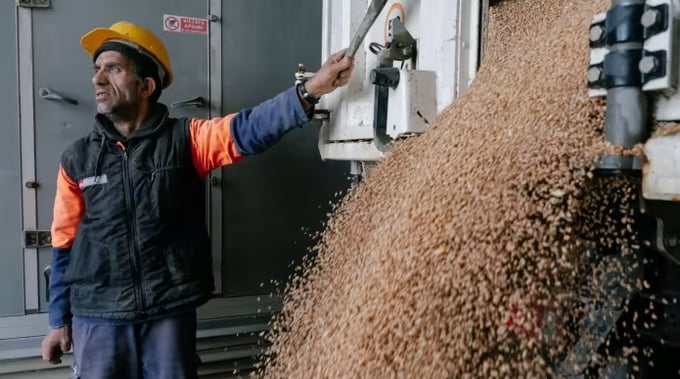June 16, 2025 | 09:31 GMT +7
June 16, 2025 | 09:31 GMT +7
Hotline: 0913.378.918
June 16, 2025 | 09:31 GMT +7
Hotline: 0913.378.918

Grain is unloaded at the port of Constanta in Romania: the country is affected by Ukrainian imports but has so far not imposed a ban. Photo: Andrei Pungovschi/Bloomberg
EU countries criticised Warsaw and other capitals on Tuesday for refusing to reverse unilateral import bans on grain from war-torn Ukraine.
Poland, Hungary, Slovakia and Bulgaria imposed varying restrictions more than a week ago on cereals and other foodstuffs following a glut building up on their local markets.
Several agriculture ministers criticised the unprecedented moves at a meeting in Luxembourg, pointing out that they were not backed by solid data and breached EU trade policy.
Czech deputy agriculture minister Miroslav Skřivánek accused the countries of shutting the door on a neighbour in need. “We as Czechs believe bans are not a good solution,” he said at a conference in Poland.
Recalling the accession of 10 mostly former Communist countries to the EU in 2004, he added: “The old member states were not afraid to let us on to their markets: now somebody is coming and knocking at our door and needing help.” Ukraine has applied to become a member of the EU and member states last year granted it official candidate status — a project spearheaded by Poland.
Polish officials argue that their country’s unwavering support for their neighbour’s struggle against Russian aggression is a separate matter.
“Poland is the number one country in the EU in terms of assistance to Ukraine but this cannot be done at the expense of Polish farmers,” said Polish state secretary for agriculture Janusz Kowalski.
He said that “customs duties should be imposed” particularly on grain but also on other foodstuffs that were competing unfairly with Polish products.
The EU dropped tariffs on Ukrainian foodstuffs and eased sanitary controls to support the country after Russia’s invasion last year. The measure expires on June 30 but is expected to be extended for another year.
The high cost of transport and bumper world grain harvests have left many supplies stuck in Ukraine’s neighbouring countries, cutting incomes for farmers there.
In Luxembourg Ukraine’s agriculture minister discussed the ban with European officials. Mykola Solskyi told EU agriculture ministers that farmers in the bloc needed Ukrainian grain to feed their livestock, and added that low grain prices were a result of a bumper harvest in Brazil, not Ukrainian production.
Several ministers intervened to condemn the unilateral measures, according to an EU official. “It‘s crucial that we do not put too many additional burdens on Ukraine,” said an EU diplomat.
European commissioners Valdis Dombrovskis and Janusz Wojciechowski also met representatives of the four countries plus Romania to broker a solution. Romania is also affected by the grain glut but has so far refrained from imposing the import ban.
Last week the five countries proposed restricting imports of five cereals, allowing them to transit only, along with €100mn of financial support for farmers. The group wants the measures extended to sunflower oil, flour, sugar, meat, dairy and other produce.
“The withdrawal of these measures may be considered only after market balance has been restored in the bordering member states or ones near the border,” said their joint submission to fellow EU ministers.
Samuel Vlcan, Slovak agriculture minister, told reporters the commission should buy grain together with the UN’s World Food Programme directly from Ukraine and co-finance its transport.
“This grain should be transported to those countries that were traditional markets of Ukraine, such as Egypt and other countries in Africa and Asia,” he said. “To put additional food into a saturated [European market] is a problem.”
(FT)

(VAN) Extensive licensing requirements raise concerns about intellectual property theft.

(VAN) As of Friday, a salmonella outbreak linked to a California egg producer had sickened at least 79 people. Of the infected people, 21 hospitalizations were reported, U.S. health officials said.

(VAN) With the war ongoing, many Ukrainian farmers and rural farming families face limited access to their land due to mines and lack the financial resources to purchase needed agricultural inputs.

(VAN) Vikas Rambal has quietly built a $5 billion business empire in manufacturing, property and solar, and catapulted onto the Rich List.

(VAN) Available cropland now at less than five percent, according to latest geospatial assessment from FAO and UNOSAT.

(VAN) Alt Carbon has raised $12 million in a seed round as it plans to scale its carbon dioxide removal work in the South Asian nation.

(VAN) Attempts to bring down the price of the Japanese staple have had little effect amid a cost-of-living crisis.